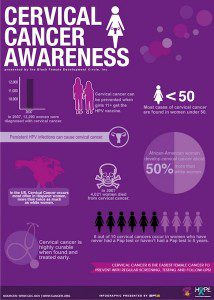January marks Cervical Health Awareness Month. Did you know that in the United States, 12,000 women get cervical cancer? Cervical cancer is caused by Human Papilloma Virus (HPV). HPV is the most common sexually transmitted disease at this time. Most women will have had some strain of HPV in their lifetime. HPV usually is self-limiting.
 Who? Cervical cancer is most common in women over 30, but screening starts at age 21. Women under 21 should not be screened. Also, the Gardasil vaccine is recommended as another way to prevent transmission of HPV. Gardasil is recommended for children (boys and girls) between the ages of 9 and 26.
Who? Cervical cancer is most common in women over 30, but screening starts at age 21. Women under 21 should not be screened. Also, the Gardasil vaccine is recommended as another way to prevent transmission of HPV. Gardasil is recommended for children (boys and girls) between the ages of 9 and 26.
What/How? The Pap Smear aka The Pap Test. The Pap is done by placing a speculum in the vagina, to visualize the cervix, which is the bottom part of the uterus. Then, a brush is rubbed into the cervix, collecting cells. These cells are thoroughly examined by a pathologist to assess is there are any cells that look atypical, or precancerous. For women 30 & above, an HPV test is done automatically in addition to looking at the cells.
Where? Many health providers can perform a Pap smear. Seeking care with a competent, sensitive, compassionate provider can help to make the experience easier and more comfortable for you. As a midwife, gynecology is part of my scope of practice. Some women may choose to do their Pap smear with a midwife, a primary care provider, an obstetrician/gynecologist, a nurse practitioner, or a physician assistant. There are many options, it is just a matter of finding one that works for you. If you are interested in seeking out a midwife in your area, go to www.midwife.org. If you have insurance, contact your instance for a list of providers.
When? For women ages 21-29, with previously normal Pap smears, screening should occur every three years. For women over 30, testing can be every three to five years. Your provider can make a recommendation when you’re due for screening after taking a detailed medical history. Gone are the days where women are screened annually, unless they have a previously abnormal Pap smear. It is currently not recommended for women to be screened with a Pap every year. However, yearly visits to address other gynecological needs is still recommended.
Why? Women who have an abnormality on their Pap smear, but follow up appropriately, rarely get cervical cancer. Early detection of precancerous cells is vital.

This post is strictly informational, so please contact your medical provider if you have questions about your own screening.


























